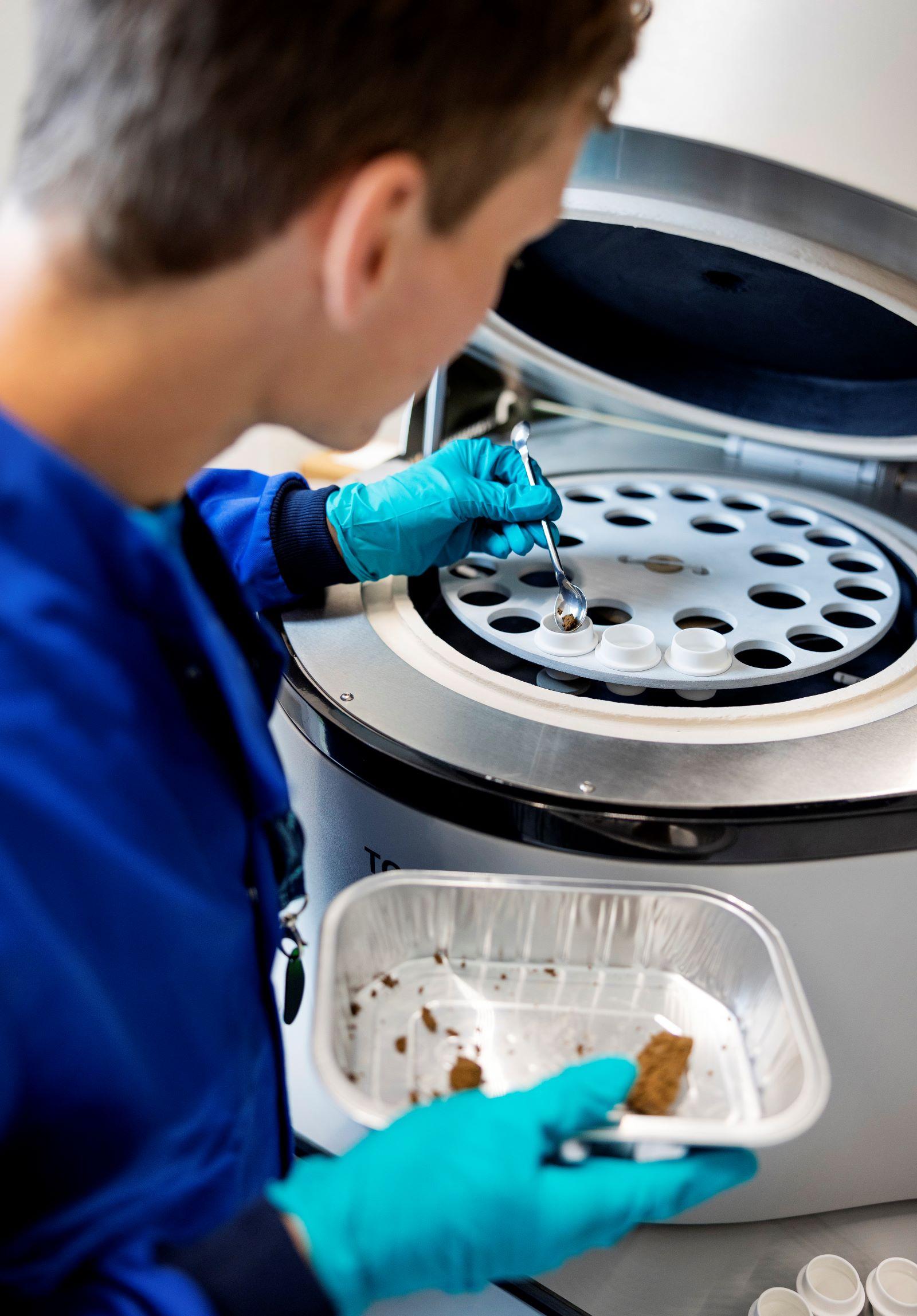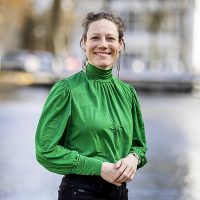Delta-lab: chemical biological physics laboratory
Our water and soil quality is under pressure. Its social consequences are becoming increasingly visible. Knowledge to realise healthy and resilient water and subsurface systems is therefore badly needed. Solutions are also needed to future-proof our infrastructure, accelerate energy transition and reduce emissions. In the Deltares laboratory, we contribute to this knowledge and solutions with experimental research at different scales.

Our Delta-lab combines chemical, biological and physical experimental applied research in a high-quality building on the Deltares campus in Delft. There, we have access to the latest equipment and technology. With an integrated perspective, the lab looks at causes and solutions for complex societal issues in soil and (ground)water. We focus on:
- Anthropogenic (man-made) substances
- Nutrients & water quality
- Greenhouse gas emissions from water and soil
- Sludge dynamics
- Energy transition and infrastructure
Our experts work on projects regarding the extent and behaviour of various pollutants in soil and (ground)water. Think of anthropogenic substances such as PFAS, biological pathogens, nutrients such as nitrate and organic substances of very high concern. How do ecosystems respond to these substances? Are micro-organisms part of the solution, for instance by degrading substances? We also investigate the reusability of treated soil or dredging and the storage and emission of greenhouse gases in water and subsoil.
In addition, the Delta-lab develops knowledge for energy transition and future-proof infrastructure. We do this by studying effects of geo- or aquathermy on the subsurface and groundwater, or bacterial corrosion of sheet pile walls or wind turbines at sea. Moreover, the lab technicians examine the properties and behaviour of silt: can it be used for our water safety and other social tasks, as a Nature-based Solution?
You have not yet indicated whether you want to accept or reject cookies. This means that this element cannot be displayed.
Or go directly to:
From sample to practice
The Delta-lab can provide unique data by combining knowledge of chemistry, microbiology, sediment, soil science and hydrology, using innovative equipment and an experimental research design.

This data is tested and further developed in Deltares' physical and digital knowledge facilities, such as wave casts or models, and used by other knowledge institutions or policymakers. Sometimes the findings from the lab enable pilots in the field, making the lab a bridge between academic research and practice.
In developing knowledge and solutions, our experts work closely with governments, knowledge institutions, NGOs and companies at home and abroad. These include drinking water companies, builders and dredgers, provinces and municipalities, water boards, consultancy and engineering firms, implementing organisations such as the Directorate-General for Public Works and Water Management, universities and commercial laboratories.
The realisation that our natural resources are too precious not to be handled with extreme care has become more urgent. That is why in the Delta-lab we combine all knowledge about our soil, water and sediment system.
Fredericke Hannes, head of Delta-lab
Better protected from flooding
Understanding the natural charectiristics and behaviour of sand, soil and sediment helps scale up Nature-based Solutions around coastal defence and climate adaptation. This physical research in the Delta-lab also contributes to efficient sediment management; such as the treatment of dredging or clay. For instance, how many years does it take for dredged up silt to dry and how can this process be accelerated?
Experiments in the lab can be tested on a larger scale in Deltares' physical research facilities such as in the Delta Flume, after which they can be scaled up to a pilot in the field. In the Kleirijperij project, for instance, it has been demonstrated that saline sludge from the Eems-Dollard can mature into suitable dike clay. We do this together with construction companies, dredgers and Rijkswaterstaat, but also with the US Corps of Engineers and consortia such as Ecoshape.
Healthy water and soil systems for people and nature
Known and unknown man-made pollutants or contaminants, so-called anthropogenic substances, threaten drinking water supplies, food safety, health, biodiversity and thus our well-being. Think of PFAS, microplastics, drug residues and other chemical compounds.
There is growing awareness in society that the quality of our living environment is deteriorating as a result. By 2027, European Union member states must comply with the Water Framework Directive; achieving and maintaining chemically clean and ecologically healthy surface water and groundwater. Green Deals (such as the Soil Strategy) to reduce the environmental impact of anthropogenic substances have also been laid down.
Deltares studies processes that influence the degradation, mobility and transport of anthropogenic substances in water, sediment and soil. We do this in the lab, in practical set-ups in our own physical research facilities such as the water-ground flume and in the field with pilots.
For example, Deltares is working on solutions for sustainable and cost-effective management of tar-contaminated soil under the Utrecht Griftpark. This involves using the natural decomposition of tar by micro-organisms in the park soil.
We work together with municipalities, policymakers, nature managers and water boards, but also with construction companies, dredgers and landowners.

Greenhouse gas reduction and energy transition
To reduce greenhouse gas emissions, as stipulated in European and national climate policy, Deltares contributes with knowledge development on emissions and greenhouse gases in water and soil management. We also work on solutions for sustainable use of our water and soil system in the energy transition.
To shape the energy transition safely and efficiently, knowledge of chemistry and microbiology is essential. For instance, together with other Deltares researchers, our lab technicians study the environmental effects of storing and generating energy with water and subsoil, such as aqua- and geothermal energy, and storing and transporting hydrogen and CO2. For example, in the HyTROS project, Deltares investigated the effects of micro-organisms on the storage of hydrogen in the subsurface. We do this in cooperation with the central government, TNO, Wageningen University & Research, Shell and dredging companies such as Boskalis and Smals, among others.
Resilient infrastructure
For a future-proof infrastructure, Deltares conducts both physical research into silt dynamics, to prevent silting of harbours, opportunities for coastal constructions or erosion of freshly applied soil after civil engineering work, and microbiological research into the effects of bacteria and micro-organisms on the condition of infrastructural objects, such as sheet piling or foundation constructions for offshore wind farms.
An example of this is the CFLO project , in which a broad group of parties investigated how corrosion damage affects the lifetime of offshore wind turbines. In this project, Deltares looked at how micro-organisms cause accelerated corrosion through laboratory tests. As a result, we know better how much corrosion to expect, under what conditions and what can be done about it. We do this with national and international dredging companies, mining companies, the Directorate-General for Public Works and Water Management as well as international governmental organisations.


